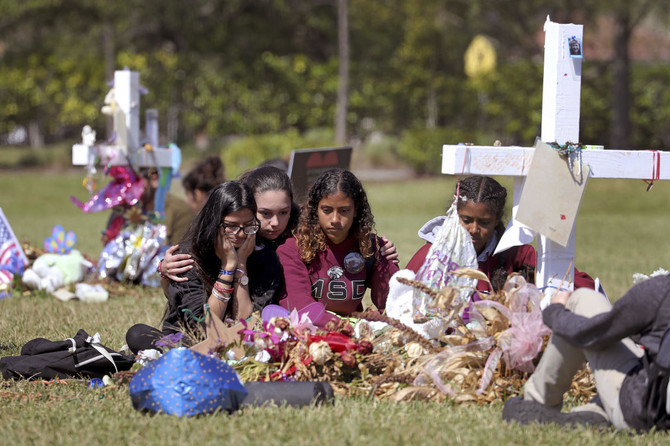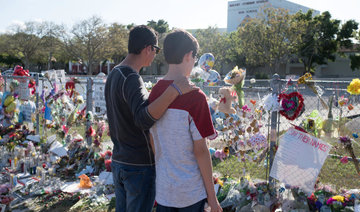DUBAI, United Arab Emirates: Student survivors of the worst high school shooting in US history took their message abroad for the first time on Saturday, calling for greater gun safety measures and sharing with educational professionals from around the world their frightening experience.
The Feb. 14 attack in Florida killed 17 people, 14 of them students, becoming one of the deadliest school shootings in US history. The attack was carried out by a former student wielding an assault-style rifle who strode into one of the school buildings and opened fire.
"It's so important to be educated, and to be educated in a productive sense is to feel safe at school," Suzanna Barna, 17, said. "No child should ever have to go through what we did."
Barna and her classmates Kevin Trejos and Lewis Mizen, all seniors at Marjory Stoneman Douglas High School in Parkland, Fla., each wore a red ribbon representing the color of their school in honor of the victims as they talked about their experience and their push for stricter gun safety measures. They spoke in Dubai at the Global Education and Skills Forum that coincides with the $1 million Global Teacher Prize, awarded to one outstanding teacher from around the world each year.
Trejos, 18, described the ordeal as "scary" and said students were crying and trying to comfort one another as they hid inside a closet in a classroom for nearly two hours.
"We didn't know where the shooter was. We didn't know if he was coming to our classroom next," Trejos said.
"We need to improve school safety," he added, saying that the students are not trying to ban guns "because we understand it's practically impossible to do," but are working to limit the accessibility of guns to criminals or potential criminals.
Like other school shootings before it, the attack has renewed the national debate on gun control. On Wednesday, tens of thousands of students across the US walked out of their classrooms to demand action from lawmakers on gun violence and school safety.
President Donald Trump and some gun supporters say the solution is to put more guns in the hands of trained school staff — including teachers. The student survivors speaking in Dubai strongly disagree, saying more guns is not the answer.
Mizen, 17, said protocols shouldn't be preparing schools for when shootings happen, but should be stopping them before they happen.
"Teachers are there to educate their students. They shouldn't have to serve as the first line of defense between them and a rampant gunman on campus," Mizen said, eliciting applause from the audience packed with educators.
Mizen said that addressing the global forum in Dubai was as a chance to talk to world education leaders and stress the importance of safety in schools.
"If we can get the international body on our side then that will make it so much easier to make change back at home," he told The Associated Press.
Barna said that despite the sharp political divide over gun control in the United States, all can agree that schools and children should be safe. She is calling for laws that would limit access to high-capacity magazine firearms, like the AR-15 assault-style rifle used by the shooter in Florida.
Students are next planning a "March for Our Lives" rally in Washington Mar. 24. Since the shooting, they have taken trips to the U.S. capital and the Florida capital of Tallahassee to confront lawmakers. In response, some major US retailers have put curbs on the sale of assault-style rifles and will no longer sell firearms to people younger than 21.
The Florida shooting was the latest in an era of school massacres that began with a shooting in 1999 at Columbine High School in Colorado that killed 13 people. The country's deadliest school shooting killed 20 children in first grade and six educators at Sandy Hook Elementary School in Connecticut in 2012.
"We've had to grow up a lot," Barna told the AP. "Emotionally it's been tough to deal with the loss we have to see every day, but we're also in the process of getting back to normal. It will happen eventually, but it's going to take time."
Survivors of US high school shooting take message abroad to Dubai
Survivors of US high school shooting take message abroad to Dubai

Lawmakers scraps ‘revenge’ tax provision from Trump’s big bill after Treasury requests its removal

- Critics warned that Section 899 of the bill "will hurt the US more than it helps"
- Global Business Alliance said the section could lead to 700,000 US jobs lost
WASHINGTON: Congressional Republicans agreed to remove the so-called revenge tax provision from President Donald Trump’s big bill Thursday after Treasury Secretary Scott Bessent asked members of Congress to do so earlier in the day.
The Section 899 provision would allow the federal government to impose taxes on companies with foreign owners, as well as investors from countries judged as charging “unfair foreign taxes” on US companies.
The measure was expected to lead many companies to avoid investing in the US out of concern that they could face steep taxes.
Bessent said in an X post that he made the request to lawmakers after reaching an agreement with other countries on the Organization for Economic Co-operation and Development Global Tax Deal. He said that after “months of productive dialogue,” they would “announce a joint understanding among G7 countries that defends American interests.”
After he made the request, Senate Finance Committee Chairman Mike Crapo, R-Idaho, and House Ways and Means Committee Chairman Jason Smith, R-Missouri, said “we will remove proposed tax code Section 899” from the bill and “Congressional Republicans stand ready to take immediate action if the other parties walk away from this deal or slow walk its implementation.”
The removal of the provision will provide “greater certainty and stability for the global economy and will enhance growth and investment in the United States and beyond,” Bessent said in his post.
An analysis by the Global Business Alliance, a trade group representing international companies such as Toyota and Nestlé, estimates that the provision would cost the US 700,000 jobs and $100 billion annually in lost gross domestic product.

The Global Business Alliance was among several groups that signed a letter addressed to Senate Majority Leader John Thune of South Dakota and Senate Finance Committee Chairman Mike Crapo of Idaho, warning of the consequences of Section 899.
The removal of the provision adds a wrinkle to Republicans’ plans to try to offset the cost of the massive package. The non-partisan Congressional Budget Office estimates that the bill would spike deficits by at least $2.4 trillion over the next decade.
Republicans are rushing to finish the package this week to meet the president’s Fourth of July deadline for passage.
Earlier Thursday, the Senate parliamentarian advised that a Medicaid provider tax overhaul central to the spending bill does not adhere to the chamber’s procedural rules, delivering a crucial blow to Republicans, who are counting on big cuts to Medicaid and other programs to offset trillions of dollars in Trump tax breaks.
EU leaders agree to prolong Russia sanctions: officials

- EU’s sweeping sanctions includes freezing of more than 200 billion euros ($234 billion) in Russian central bank assets
BRUSSELS: The EU’s 27 leaders on Thursday agreed to extend sanctions on Russia for another six months, resolving fears that Kremlin-friendly Hungary would let the measures lapse, officials said.
The decision at a summit in Brussels means that the EU’s sweeping sanctions over the war in Ukraine, including the freezing of more than 200 billion euros ($234 billion) in Russian central bank assets, will remain in force until at least early 2026.
It comes after officials said they were preparing contingency plans to keep the bloc’s economic punishment on Moscow in place should Hungarian leader Viktor Orban refuse to budge.
EU counterparts had feared a refusal by Budapest to renew the measures could blow a massive hole in the leverage the bloc holds over Russia as the United States presses peace efforts.
Orban took the decision to the wire the last time the sanctions — which need to be extended every six months — came up for renewal in January.
But while the EU made sure its existing measures will remain in place, it failed to get clearance on a new package of sanctions due to a blockage by Hungary’s ally Slovakia.
Slovakian leader Roberto Fico refused at the summit to greenlight the new round of sanctions due to a separate dispute with Brussels over plans to cut off imports of Russian gas by the end of 2027.
Slovakia remains dependent on Russian gas imports and earns money from transit fees for supplies piped across its territory.
Fico held talks with EU chief Ursula von der Leyen earlier on Thursday but failed to get the concessions he wants and announced he would hold up approval of the sanctions package.
Ukraine’s President Volodymyr Zelensky urged EU leaders in a video address to adopt the strong package “targeting Russia’s oil trade, shadow tanker fleet, banks, and supply chains that bring equipment or parts for making weapons.”
Officials say, however, that a push to lower a price cap on Russian oil exports has been shelved after Washington failed to back the push as part of a broader G7 initiative.
Ukraine, Russia exchange another group of POWs

CHERNIGIV REGION, Ukraine: Ukraine and Russia exchanged a new group of captured soldiers on Thursday, the latest in a series of prisoner swaps agreed at peace talks in Istanbul earlier this month.
Neither side said how many prisoners were released in the latest exchange.
The two countries pledged to swap at least 1,000 soldiers each during their direct meeting in Istanbul on June 2 but no follow-up talks have been scheduled.
The return of prisoners of war and the repatriation of war dead have been among the few areas of cooperation between the warring sides since Moscow invaded Ukraine in 2022.
“Today, warriors of the Armed Forces, the National Guard, and the State Border Guard Service are returning home,” Ukrainian President Volodymyr Zelensky said on social media.
He shared images of Ukrainian soldiers draped in blue-and-yellow national flags, smiling and tearfully embracing.
AFP reporters in Ukraine’s northern Chernigiv region saw relatives awaiting the prisoner release.
Some family members waved posters of missing or captured soldiers in the hope someone would recognize their loved ones and bring them news.
Svitlana Nosal learned her husband Viktor had been freed.
“It’s such a joy, I don’t know how to describe it, how to put it into words,” she said, laughing and crying in the late afternoon sun.
The majority of those released on Thursday were held captive for more than three years, according to Ukraine’s Coordination Headquarters for the Treatment of Prisoners of War.
Many of them were taken prisoner in Mariupol, a Ukrainian port city that fell to Russian forces in 2022 following a nearly three-month siege, it said.
Russia said its soldiers had been transferred to Belarus and were receiving “psychological and medical care.”
“Another group of Russian servicemen has been returned from territory controlled by the Kyiv regime,” the defense ministry said in a statement.
It posted a video showing freed Russian soldiers draped in their national flag, chanting “Russia, Russia, Russia!“
UN climate chief warns ‘lot more to do’ before COP30

BONN: UN climate chief Simon Stiell urged countries on Thursday to accelerate negotiations ahead of the COP30 in Brazil as there was a lot left to be done.
Speaking after two weeks of technical talks in Bonn, Stiell closed the annual climate diplomacy event saying: “We need to go further, faster, and fairer.”
Bonn is home to the UN Climate Change Secretariat, which coordinates international climate policy and hosts preparatory talks each year ahead of climate summits.
“I’m not going to sugar coat... we have a lot more to do before we meet again in Belem,” he said.
COP30 is due to be held on November 10-21 in the Amazonian city which is the capital of Para state.
At last year’s UN COP29 summit in Azerbaijan, rich nations agreed to increase climate finance to $300 billion a year by 2035, an amount decried as woefully inadequate.
Azerbaijan and Brazil, which is hosting this year’s COP30 conference, have launched an initiative to reduce the shortfall, with the expectation of “significant” contributions from international lenders.
This year’s COP comes as average global temperatures in the past two years have exceeded the 1.5 degrees Celsius benchmark set under the Paris climate accord a decade ago.
“There is so much more work to do to keep 1.5 alive, as science demands. We must find a way to get to the hard decisions sooner,” Stiell said.
Under the Paris Agreement, wealthy developed countries — those most responsible for global warming to date — are obliged to pay climate finance to poorer nations.
Other countries, most notably China, make voluntary contributions.
White House wants deep cut in US funding for war crimes investigations, sources say

- The programs also include work in Iraq, Nepal, Sri Lanka and the Gambia
- The expectation that Rubio would argue for many of the programs to be continued is slim
WASHINGTON/THE HAGUE: The White House on Wednesday recommended terminating US funding for nearly two dozen programs that conduct war crimes and accountability work globally, including in Myanmar, Syria and on alleged Russian atrocities in Ukraine, according to two US sources familiar with the matter and internal government documents reviewed by Reuters.
The recommendation from the Office of Management and Budget, which has not been previously reported, is not the final decision to end the programs since it gives the State Department the option to appeal.
But it sets up a potential back-and-forth between the OMB and US Secretary of State Marco Rubio and his aides, who will reply to OMB with their suggestions on which programs deserve to continue. The programs also include work in Iraq, Nepal, Sri Lanka and the Gambia.
The State Department and OMB did not immediately respond to a request for comment.
The expectation that Rubio would argue for many of the programs to be continued is slim, according to two US officials. However, the top US diplomat could make a case to keep crucial programs, such as aiding potential war crimes prosecutions in Ukraine, according to one source familiar with the matter.
Several of the programs earmarked for termination operate war crimes accountability projects in Ukraine, three sources familiar with the matter said, including Global Rights Compliance, which is helping to collect evidence of war crimes and crimes against humanity across Ukraine, such as sexual violence and torture.
Another is the Legal Action Network, a legal aid group which supports local efforts to bring cases against Russian suspects of war crimes in Ukraine, the sources said.
Requests seeking comment from the groups were not immediately answered.
State Department bureaus that would like to preserve any war crimes and accountability programs should send their justifications by close of business day on July 11, said an internal State Department email seen by Reuters.
CHANGING PRIORITIES
The administration of President Donald Trump has frozen and then cut back billions of dollars of foreign aid since taking office on January 20 to ensure American-taxpayer money funds programs that are aligned with his “America First” policies.
The unprecedented cutbacks have effectively shut down its premier aid arm US Agency for International Development, jeopardized the delivery of life-saving food and medical aid and thrown global humanitarian relief operations into chaos.
The OMB recommendation is yet another sign that the administration is increasingly de-prioritizing advocacy for human rights and rule of law globally, an objective that previous US administrations have pursued.
While US foreign aid freezes had already started hampering an international effort to hold Russia responsible for alleged war crimes in Ukraine, Wednesday’s recommendations raise the risk of US completely abandoning those efforts.
Among the programs that are recommended for termination is a $18 million State Department grant for Ukraine’s Prosecutor General’s Office that is implemented by Georgetown University’s International Criminal Justice Initiative, two sources said.
While the programs do not directly impact Ukraine’s frontline efforts to fend off Russia’s invasion, supporters say they represent the best chance of extensively documenting reported battlefield atrocities in Europe’s biggest conflict since World War Two, now grinding toward a fourth year.
Ukraine has opened more than 140,000 war crime cases since Moscow’s February 2022 invasion, which has killed tens of thousands, ravaged vast swathes of the country and left behind mental and physical scars from occupation. Russia consistently denies war crimes have been committed by its forces in the conflict.
PATH TO APPEAL
Other programs include one that does accountability work on Myanmar army’s atrocities against Rohingya minorities as well as on the persecution of Christians and other minorities by Syria’s ousted former president Bashar Assad, two sources said.
While the OMB recommendations could face State Department push-back, the criteria to appeal are set very strictly.
In an internal State Department email, the administration cautioned that any effort to preserve programs that were recommended to be terminated should be thoroughly argued and directly aligned with Washington’s priorities.
“Bureaus must clearly and succinctly identify direct alignment to administration priorities,” the email, reviewed by Reuters said.


















